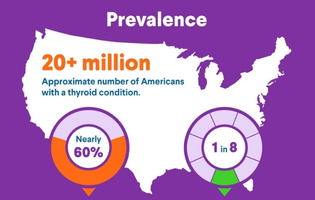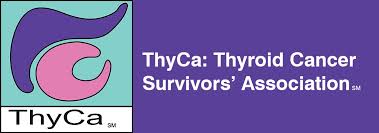Thyroid Glossary
A
Anti-thyroid antibodies: Proteins produced by your body’s immune system that are part of the autoimmune response against the thyroid. They attack and damage thyroid cells, reducing the amount of thyroid hormone that your thyroid makes and leading to hypothyroidism (underactive thyroid). Specific anti-thyroid antibodies include anti-thyroid peroxidase and anti-thyroglobulin. Some patients have positive anti-thyroid antibodies but do not develop hypothyroidism.
Autoimmune thyroid disease: A thyroid condition that occurs when your immune system mistakenly attacks your thyroid cells, which causes your thyroid to produce too much or too little thyroid hormone, and which may cause your thyroid to become enlarged (goiter). Examples include Graves’ disease (a type of hyperthyroidism, or overactive thyroid) and Hashimoto’s thyroiditis (a type of hypothyroidism, or underactive thyroid).
B
Biopsy: A test that uses a fine (thin) needle to remove a small sample of thyroid tissue to check for the presence of cancer cells.
C
Computerized tomography (CT) scan: A type of scan that uses X-rays and computer technology to create images of your thyroid. Your health care professional can use CT scans to learn more about your thyroid health and diagnose or rule out certain thyroid conditions. Thyroid ultrasound is preferred to CT scans for many thyroid conditions. A CT scan is occasionally used to evaluate patients with goiter or in the follow up of thyroid cancer.
Congenital hypothyroidism: A condition that occurs when an infant is born with an inadequate amount of thyroid tissue or an enzyme defect that does not allow normal thyroid hormone production. If this condition is not treated promptly, physical stunting and/or intellectual impairment may develop.
Corticosteroids: Also referred to as steroids, these are a type of anti-inflammatory medication that act similarly to some types of hormones in your body. They are sometimes used to treat hyperthyroidism (overactive thyroid).
E
Endemic goiter: A goiter (enlarged thyroid) caused by a deficiency of iodine, a mineral found in certain foods.
G
Goiter: An enlarged thyroid. You may develop a goiter when your entire thyroid swells up and becomes enlarged, or a goiter may occur when your thyroid grows one or more lumps, known as nodules. There are several types of goiter, including simple goiter, nodular goiter, multinodular goiter, and endemic goiter. Most goiters are not cancerous.
Graves’ disease: An autoimmune disorder that causes the immune system to overstimulate the thyroid gland to produce too much thyroid hormone, or hyperthyroidism. Graves’ disease is the most common cause of hyperthyroidism in the United States. It is named after Irish physician Robert Graves.
H
Hashimoto’s thyroiditis: Also known as Hashimoto’s disease or chronic lymphocytic thyroiditis, Hashimoto’s is a condition where immune cells and autoantibodies created by your body’s immune system attack and damage thyroid cells, diminishing your thyroid’s ability to make the amount of thyroid hormone your body needs and leading to hypothyroidism (underactive thyroid). A type of hypothyroidism, Hashimoto’s is the most common kind of thyroid disease in the United States. It is named after Japanese physician Hakaru Hashimoto. It can run in families, and women are more commonly affected.
Hormones: Chemical messengers that travel through your bloodstream to give your organs instructions on how to function. For example, thyroid stimulating hormone (TSH) tells your thyroid how much of the thyroid hormones triiodothyronine (T3) and thyroxine (T4) to make.
Hyperthyroidism: A condition that occurs when your thyroid makes more than the normal amount of thyroid hormone. As a result, many of your bodily functions speed up. In its mildest form, hyperthyroidism may not cause recognizable symptoms. However, the symptoms can be uncomfortable, disabling, or even life-threatening. Treatment can usually reverse and relieve symptoms.
Hypothyroidism: A condition that occurs when your thyroid gland creates less than the normal amount of thyroid hormone. As a result, many of your bodily functions slow down. In its mildest form, hypothyroidism may not cause recognizable symptoms. However, the symptoms can be uncomfortable, disabling, or even life-threatening. It is a permanent condition that can be treated with daily thyroid hormone replacement medication. Hypothyroidism is the most common kind of thyroid dysfunction.
I
Iodine: A dietary mineral that helps your body make thyroid hormones. It is found in foods such as seafood, seaweed, iodized salt, and dairy foods, as well as some types of supplements, cough syrups, and other medications. Getting too much or too little iodine in your diet could impact your thyroid health. For example, iodine deficiency can contribute to the development of thyroid nodules or goiter, although it is uncommon in the United States. Excess iodine can worsen hyperthyroidism (overactive thyroid), especially in people with thyroid nodules. Do not take iodine supplements unless your health care professional recommends them.
L
Levothyroxine: A medication used to treat Hashimoto’s thyroiditis and other types of hypothyroidism (underactive thyroid). Levothyroxine replaces the thyroid hormone that your underactive thyroid is not producing enough of. It is an identical synthetic version of the thyroid hormone T4. Brand names for levothyroxine include Levothroid, Levoxyl, Synthroid, Tirosint, and Unithroid.
M
Magnetic resonance imaging (MRI): A type of scan that uses a large magnet and radio waves to create images of your thyroid. Obtaining a neck MRI is very uncommon except for the rare instance of thyroid cancer involving the spine/spinal cord, or sometimes troubleshooting a neck mass of unclear origin. Your health care professional may use an MRI to learn more about your thyroid health and diagnose or rule out certain thyroid conditions.
Methimazole (Tapazole): One of two medications available for treating hyperthyroidism. The other is propylthiouracil (PTU). Methimazole is usually preferred because PTU can rarely cause severe and potentially fatal liver damage. These medications control hyperthyroidism by slowing thyroid hormone production. They may take several months to normalize thyroid hormone levels.
Multinodular goiter: A goiter (enlarged thyroid) that contains several nodules.
N
Nodular goiter: A goiter (enlarged thyroid) that contains a single thyroid nodule.
O
Overactive thyroid gland (hyperthyroidism): A condition that occurs when your thyroid makes above-normal amounts of the hormones triiodothyronine (T3) and thyroxine (T4). The most common type of overactive thyroid condition is Graves’ disease.
P
Pituitary gland: Often referred to as the master gland of the body, the pituitary gland regulates many activities of other glands. For example, the pituitary gland creates thyroid-stimulating hormone (TSH), which signals the thyroid to produce and release the right amount of the thyroid hormones triiodothyronine (T3) and thyroxine (T4) to meet the body’s needs.
Postpartum thyroiditis: A type of thyroid condition that can occur in a woman after giving birth. It affects 5%-10% of women who develop mild to moderate hyperthyroidism (overactive thyroid) within several months of delivery. Postpartum hyperthyroidism usually lasts for approximately one to two months. It is often followed by several months of hypothyroidism (underactive thyroid), but most women eventually recover normal thyroid function. The condition may occur again with subsequent pregnancies.
Propylthiouracil (PTU): One of two medications used to treat hyperthyroidism. The other is methimazole (Tapazole). Methimazole is usually preferred because PTU can rarely cause severe and potentially fatal liver damage. In pregnancy, PTU is often preferred because of the higher risk of birth defects with methimazole. These medications control hyperthyroidism by slowing thyroid hormone production. They may take several months to normalize thyroid hormone levels.
R
Radioactive iodine treatment: An oral treatment for Graves’ disease and other types of hyperthyroidism (overactive thyroid). It is taken in a capsule or liquid form. Radioactive iodine enters your thyroid cells from your bloodstream and gradually destroys overactive thyroid cells. Results are usually seen in eight to 12 weeks, although it can take up to six months.
Radioactive iodine uptake (RAIU) test: A test that uses imaging and a small amount of radioactive iodine to measure the activity level of your thyroid. The test determines how much iodine your thyroid gland can collect, and a thyroid scan shows how the iodine is distributed throughout the thyroid gland. It is commonly used to check for Graves' disease — a type of hyperthyroidism (overactive thyroid) — or thyroid nodules that are making too much thyroid hormone.
S
Simple goiter: A goiter (enlarged thyroid) that occurs when your entire thyroid gets larger on its own, rather than as the result of one or more thyroid nodules. This is also known as a diffuse goiter.
Support groups: Organizations that provide information, resources, support and advocacy for people living with thyroid disease. Some helpful thyroid support groups include ThyCa: Thyroid Cancer Survivors’ Association thyca.org, Graves’ Disease and Thyroid Foundation gdatf.org, and Listen to Your Eyes, for people living with thyroid eye disease thyroideyes.com.
T
Thyroid blood tests: Tests that check your blood for abnormal levels of substances that affect your thyroid health and/or function. Blood tests may measure thyroid-stimulating hormone (TSH), thyroxine (T4), triiodothyronine (T3), and/or autoantibodies that affect your thyroid.
Thyroid cancer: A malignant tumor or growth originating within your thyroid gland. Most types of thyroid cancer are treatable, and most thyroid cancer survivors who receive treatment go on to live long, healthy, normal lives.
Thyroid disease: Any disorder that affects the health or function of the thyroid gland.
Thyroid eye disease: Also known as Graves’ ophthalmopathy, this is an autoimmune condition that occurs in some patients living with Graves’ disease. It happens when the immune system mistakenly attacks the tissues behind your eyes. When it occurs, patients may develop swelling of the muscles and other tissues around the eyes, causing eye prominence, discomfort, or double vision. Like other autoimmune diseases, this condition tends to affect multiple family members.
Thyroid nodules: Lumps that develop on the thyroid as the result of an overgrowth of thyroid cells. They are usually not cancerous. A nodule may be “hot” (which means it produces thyroid hormones) or “cold” (which means it does not make thyroid hormones). Thyroid nodules are fairly common.
Thyroid scan: A type of test that uses a small dose of radioactive isotope to create an image of your thyroid. It helps your health care professional determine if a thyroid nodule is making too much thyroid hormone.
Thyroid: A small, butterfly-shaped gland located in the base of your neck just below your Adam's apple. Your thyroid impacts the action of many of your organs, including your heart, brain, liver, kidneys, and skin. It plays a role in many of your body's functions, including metabolism, blood circulation, sleep, mood, temperature regulation, weight, and reproduction. Undiagnosed thyroid issues can increase the risk of other serious conditions such as cardiovascular disease, obesity, osteoporosis, and infertility.
Thyroidectomy: A surgical procedure that removes all or part of your thyroid. It is one of several treatment options for Graves’ disease and some other types of hyperthyroidism (overactive thyroid) and thyroid cancer. If the thyroid is removed completely, lifelong thyroid hormone replacement therapy is required.
Thyroid-stimulating hormone (TSH): Also known as thyrotropin, TSH is a hormone produced by the pituitary gland that tells your thyroid how much of the thyroid hormones thyroxine (T4) and triiodothyronine (T3) to make. A lower-than-normal TSH level may indicate hyperthyroidism (overactive thyroid) and a higher-than-normal TSH level may indicate hypothyroidism (underactive thyroid).
Thyroid-stimulating immunoglobulin (TSI): An antibody sometimes found in the blood when Graves’ disease is the cause of hyperthyroidism (overactive thyroid).
Thyrotropin receptor antibody (TRAb): An antibody sometimes found in the blood when Graves’ disease is the cause of hyperthyroidism (overactive thyroid).
Triiodothyronine (T3): One of two main hormones created by your thyroid. Along with thyroxine (T4), T3 travels throughout your body to regulate blood pressure, body temperature, heart rate, metabolism, and how your body reacts to other hormones.
Thyroxine (T4): One of two main hormones created by your thyroid. Along with triiodothyronine (T3), T4 travels throughout your body to regulate blood pressure, body temperature, heart rate, metabolism, and how your body reacts to other hormones.
U
Ultrasound: A type of imaging that uses sound waves to create images of your thyroid. Ultrasound imaging can provide information about factors such as the size of your thyroid and the presence, size, and number of thyroid nodules. This is typically the preferred method of imaging the thyroid gland.
Underactive thyroid gland (hypothyroidism): A condition that occurs when your thyroid makes below-normal amounts of the hormones triiodothyronine (T3) and thyroxine (T4). The most common type of underactive thyroid condition is Hashimoto’s thyroiditis.
W
Watchful waiting: Also known as observation, this is an approach in which a health care professional watches a thyroid condition over a period of time, scheduling regular checkups or testing to look for changes that may signal the need for treatment. For example, if you have a benign (not cancerous) thyroid nodule that is causing no symptoms, your health care professional who advises watchful waiting may check it regularly and treat it only if it gets larger or starts causing symptoms.





 DOWNLOAD
DOWNLOAD




